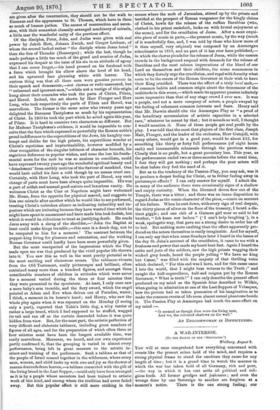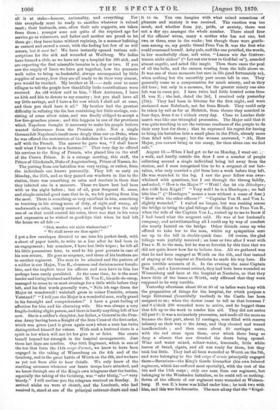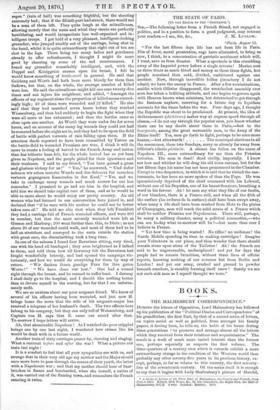all is at stake—honour, nationality, and everything. For this everybody
must be ready to sacrifice whatever is valued most ; their husbands, sons, often their sole supports, are taken from them ; younger sons not quite of the required age for service go as volunteers, and father and mother are proud to let them go ; they leave home without repining, in a manner befitting so earnest and sacred a cause, with the feeling but few of us will return, but it must be ! We have instantly opened various sub- scriptions for the sick and wounded at Weilburg. We ladies have formed a club, as we have set up a hospital for 200 sick, and are expecting the first miserable inmates in a day or two. If you saw the supply of linen we have got together, how the peasants walk miles to bring us basketsful, always accompanied by little supplies of money, how they are all ready to do their very utmost, you would be touched. My brother at M— rode over to some villages to tell the people how thankfully little contributions were received. An old widow said to him, " Herr Amtmann, I have no kith and kin to devote to my country ; but you shall have all my little savings, and I have a fat cow which I shall sell at once, and then you shall have it all." My brother had the greatest difficulty in refusing the tin box containing her little savings, con- sisting of some silver coins, and was finally obliged to accept a few five-grosehen pieces ; and this happens in one of the provinces which Napoleon thought it necessary to make his people believe wanted deliverance from the Prussian yoke. Not a single German felt Napoleon's insult more deeply than our ex-Duke, when he was offered the restoration of his dukedom if he would ally him- self with the French. The answer he gave was, "I shall know well what I have to do as a German !" That very day he offered his services to the King of Prussia, who placed him on the staff of the Crown Prince. It is a strange meeting, this staff, the Prince of Gliickstadt, Duke of Augustenberg, Prince of Nassau, &c.
The parting from our battalion was very trying, or rather, from the individuals one knows personally. They left us early on Monday, the 25th, and as they passed our windows in line to the station, there was something so calm and resolute in them that they infected one in a measure. Those we know best had been with us the night before ; last of all, poor Sergeant E. came, and simple-minded good man that he is, we felt parting from him the most. There is something so very excellent in him, something so touching in his strong sense of duty, of right and wrong, all underneath a calm, manly manner ; and though he was the only one of us that could control his voice, there was that in his voice and expression as he wished us good-bye that when he had left the house we all felt :-
"Dick werden wir nicht wiedersehen ! "
" We shall never see thee again!"
I put a few envelopes directed to me into his pocket-book, with a sheet of paper inside, to write us a line after he had been in an engagement ; but somehow, I have but little hopes ; he left all his little possessions here, to send to his poor parents in case of his non-return. He goes as sergeant, and three of his brothers are in another regiment. The man to be admired and the pattern of a soldier is our Major, Von B., clearness and decision never forsake him, and the implicit trust his officers and men have in him has perhaps been rarely paralleled. At the same time, he is the most tender and loving husband and father. H. Von E., his aide-de-camp, managed to come to us most evenings for a little while before they left, and his first words generally were, " Nein ich sage ihnen der Major ist wundervoll! wahrhaft gross in seiner Umsicht, seinem Verstand l" " I tell you the Major is a wonderful man, really grand in his foresight and comprehension !" I have a great feeling of affection for him and his charming wife. She was always a very fragile-looking slight person, and there is hardly anything left of her now. She is a soldier's daughter, her father, a General in the Prus- sian Army having been a Knight of the Iron Cross of the first order~, which was given (and is given again now) when a man has twice distinguished himself for valour. With such a husband there is a spirit in her which will not let her give in or faint. She exerts herself beyond her strength in the hospital arrangements. Just these last days are terrible. Our 80th Regiment, which is one of the ten that form the 11th corps d'armde, we know to have been engaged in the taking of Wissenburg on the 4th and of the Geisberg, and in the great battle of Worth on the 6th, and we have as yet not been able to hear details. We only know of the startling successes wherever our brave troops have attacked, and we know through one of the King's own telegrams that the battles, especially the taking of the Geisberg, was " sehr blutig,"—" very bloody." I will enclose you the telegram received on Sunday. It arrived whilst we were at church, and the Landrath, who had received it, stood at one of the principal entrance-doors and read it to us. You can imagine with what mixed sensations of pleasure and anxiety it was received. The emotion was too much, and whether from joy, pride, or anxiety, there was not a dry eye amongst the whole number. There stood four of the officers' wives, many a mother who has not one, but two or three, sons in the ranks ; but though there were gentle- men among us, my gentle friend Frau Von B. was the first who could command herself. Ashy pale, and like one petrified, the words, in her wonderfully clear, soft voice, " Lassen wir das Gottver- trauen nicht sinken" (" Let not our trust in God fail us"), sounded almost angelic, and acted like magic. Then there came the peal of all the bells, and the cannon roaring from the hills above us. It was one of those moments but rare in life (and fortunately so), when nothing but the unearthly part seems left in one. They generally come as a compensation for much misery, and so they did here ; but only in a measure, for the greater misery one also felt was to come yet. I have twice had little hurried notes from H. von E. ; the last, dated the 3rd, I received only yesterday (7th). They had been in bivouac for the first night, and were stationed near Rohrbach, not far from Bitsch. They could only be taken by rail as far as Biebrich, from thence they marched in four days, from 6 to 1 o'clock every day. Close to Landau their march was like one triumphal procession. The Major said that it was quite touching to see the extreme readiness of the people to do their very best for them ; that he expressed his regret for having to bring his battalion into a small place in the Pfalz, already more than filled with troops ; but the woman answered, " Ah, Herr Major, you cannot bring us too many, for then alone can we feel safe."
August 10.—When I had got so far on Monday, I went out
a walk, and hardly outside the door I saw a number of people collecting around a single individual being led away from the station, and I soon recognized him to be a sergeant of our bat- talion, who only married a girl from here a week before they left. He was wounded in the leg. I saw the poor fellow was over- whelmed with questions, but I cut through the throng boldly, and asked, " How is the Major ?" " Wohl ! das ist ein Handegen; den trifft kein Kugel !" " Very well I he is a Handegen ; no ball hits him !" (" Handegen " means a man without a sense of fear.) " How with the other officers ?" " Captains Von H. and Von L. slightly wounded." I waited no longer, but was rushing across the bridge to bring the glad tidings of the Major to Frau Von B., when the wife of the Captain Von L., rushed up to me to know if I had heard what the sergeant said. He was of her husband's company, and notwithstanding all I could say by way of comfort she nearly fainted on the bridge. Other friends came up who offered to take her to the man, whilst my sympathies sent me up to the hill in double-quick time. Of course, the glad tidings were joyfully received ; an hour or two after I went with Frau v. B. to the man, but he was so feverish by this time that we did not quite know how far to believe him. All we gathered was that he had been engaged at Worth on the 6th, and that instead of staying at the hospital at Nauheim he made his way here. He gave terrible accounts of it. In the evening the same Captain Von H., and a Lieutenant arrived, they had both been wounded at Wiessenburg and been at the hospital at Nauheim, so that they knew little of the losses at Worth, only affirmed that they were supposed to be very terrible.
Yesterday afternoon about 60 or 80 of us ladies were busy with the preparation of things for the hospital, for which purpose a large Rittersaal (beautifully vaulted) in the Castle has been assigned to us ; when the doctor came to tell us that between 7 and 8 o'clock 200 wounded were to arrive, and he begged those that felt up to the work to render him aid. They did not arrive till past 9 ; it was a melancholy procession, and made all the more so because the first part, about 12 carriages, were filled with reserve infantry on their way to the Army, and they cheered and waved handkerchiefs ; and then came about 40 carriages more, with the red cross upon them, over which there hung so deep a silence that one dreaded the doors being opened. Wine and water mixed, seltzer-water, lemonade, little white loaves of bread, cigars, and all was ready for them, but they took but little. They had all been wounded at Worth on the 7tb, and were belonging to the 3rd corps d' armee principally engaged there—Bavarians—the King's Garde Grenadier (his own beloved regiment, which has suffered most specially), with the rest of the 5th and the 11th corps ; only one man from our regiment, but belonging to the Wiesbaden battalion, so he could tell us nothing. Seven of the officers of our regiment were wounded at Weissen- burg. H. von E.'s horse was killed under him ; he took two with him, and this was his favourite. The men all say that the "Kiigel-
regen " (rain of ball) was something frightful, but the shooting extremely bad ; that if the fiftieth part had struck, there would not be a man of them left. They quite laugh at the mitrailleuses, allowing merely that the noise and whirl they create are perfectly bewildering, and would incapacitate less well-organized and in- telligent troops. I got hold of a very pleasant, intelligent-looking grenadier, who jumped nimbly out of the carriage, being shot in the hand, whilst it is quite extraordinary that eight out of ten are shot in the legs. There being too many ladies and gentlemen already to offer refreshments, I thought I might do more good by cheering up some of the sad countenances. I found my grenadier remarkably intelligent, and, with the Diippel and Koniggratz crosses upon his breast, I felt he would know something of battle-work in general. He said that Geisberg and Worth had both been more bloody for them than Sadowa, but that, on the whole, the average number of killed were less. He said the mitrailleuse might kill one man twenty-five times and not injure his neighbour, and added, "Amongst the officers of my regiment alone the proportion of killed seems exceed- ingly high ; 40 of them were wounded and 22 killed." He also said that they had marched seven hours before they reached Wiessenburg, and then had suddenly to begin the fight when they were all more or less exhausted ; and then the battles came so close upon one another. At Worth they were under fire for seven hours, and on account of the many leg wounds they could not half be removed before the night set in, and they had to lie upon the field of battle with perfect torrents of rain falling upon them. If the atrocious deeds reported to have been committed by Turcos on the battle-field to wounded Prussians are true, I think it will do more to create a feeling of hatred to the French Army and nation than has hitherto been felt, for the whole hatred has as yet been given to Napoleon, and the people pitied for their ignorance and their weakness. I said to my friend, " You have gained a great and glorious victory for us !" " Yes," he answered, " Und dafiir nehmen wir schon manche Wnnde and den Schmerz fur manchen verloren gegangenen Kameraden in den Kauf," " Yes, and we take in exchange many wounds and much sorrow for our lost comrades." I promised to go and see him in the hospital, and told him we should take capital care of them, and as he would be able to move about he would enjoy our pretty country. An old woman who had listened to our conversation here joined in, and declared that "if he were with his mother he could not be better taken care of." He told me also that when they left 'Frankfort they had,a carriage full of French wounded officers, and were 800 in number, but that the most severely wounded were left at Giessen and Marburg; 200 went further than this, to Dietz ; as not above 20 of our wounded could walk, and most of them had to be laid on stretchers and conveyed to the carts outside the station with great care, the disembarking took a long time.
In one of the saloons I found four Bavarians sitting, very tired, one with his head all bandaged ; they soon brightened as I talked to them, and told them how all Germany felt the Bavarians had fought wonderfully bravely, and had opened the campaign vic- toriously, and how we would do everything for them by way of return. " Wir danken ihnen gnadige Frau ftir ihre guten Wide !" " We have done our best." One had a wound right through the breast, and he seemed to suffer least. I daresay I shall daily go to the hospital, and I should like nothing better than to devote myself to the nursing, but for that I am unfortu- nately unfit.
We are so anxious about our poor sergeant friend. We know of several of his officers having been wounded, and just now H. brings home the news that the wife of his sergeant-major has received a telegram of her husband's death. The two officers here belong to his company, but they can only tell of Weissenburg, and Captain von H. says that E. came out sound after that. To-morrow I hope letters will arrive.
Ah, that abominable Napoleon ! As I watched the poor crippled beings one by one last night, I wondered how crimes like his would be dealt with in a future world .
Another train of sixty carriages passes by, cheering and singing. What a contrast before and after the war I What a picture our train last night !
It is a comfort to feel that all your sympathies are with us, and strange that in their very old age my mother and the Major should once more have to pass through the scenes of their youth, the latter with a Napoleonic war ; and that my mother should hear of Saar- briicken in flames and bombarded, when she herself, a native of it, was carried out of the flaming town, and remembers the French entering it twice.
































 Previous page
Previous page